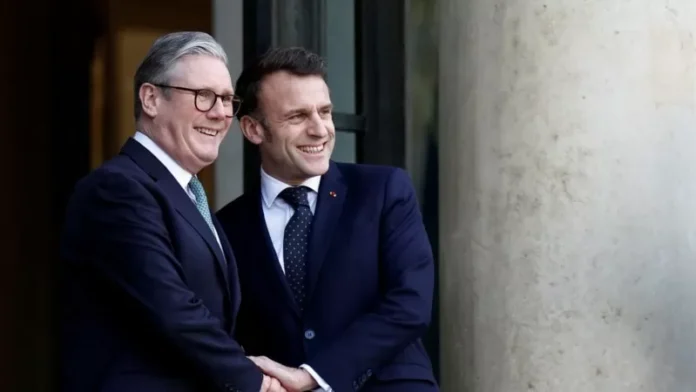London/Paris – French President Emmanuel Macron and British Prime Minister Keir Starmer are set to travel to Washington next week in an effort to address mounting concerns in Europe over US President Donald Trump’s stance towards Ukraine and his relationship with Russian President Vladimir Putin.
As leaders of Europe’s two nuclear powers, Macron and Starmer will make separate visits to the White House with the goal of persuading Trump to not rush into a ceasefire deal with Putin at any cost and to ensure Europe’s involvement in any negotiations. They will also discuss providing military guarantees to Ukraine.
Macron, who has established a rapport with Trump since their first meeting, believes that failing to reach a fair deal with Ukraine would be a sign of weakness to other world powers, such as China and Iran. In a recent question and answer session on social media, he stated that he will tell Trump that he cannot appear weak in the face of Putin, as it goes against his character and the interests of the United States.
The visits come at a time when there is a strained relationship between Trump and Ukrainian President Volodymyr Zelenskyy. Trump has even gone as far as calling Zelenskyy a dictator, which has caused alarm among Kyiv’s European allies. This is on top of the already aggressive stance that the US has taken on trade, diplomacy, and domestic European politics.
Philip Golub, a professor in international relations at the American University in Paris, described Trump’s recent actions and rhetoric from other US officials as a “major shock” for the Europeans. “They could not have expected that an ultra-nationalist coalition would emerge in the US and challenge Europe’s voice in world affairs in such a strong way,” he told Reuters.
Macron sees this visit as an opportunity to play a historic role in ensuring that Europe has a say in the negotiations on Ukraine. However, whether he will be able to achieve this goal remains uncertain.
Starmer, who has also warned against a “temporary pause” in the conflict with Putin, will also be visiting Washington this week. In a recent Fox News podcast, Trump criticized both Macron and Starmer for not doing enough to end the war, despite describing the former as a friend and the latter as a “very nice guy.”
However, both France and Britain are determined to show Trump that they are willing to take on a bigger role in European security. They are currently discussing options with their allies for providing military guarantees to Ukraine, and will ask Trump to provide assurances in any post-ceasefire deal.
The planning for a post-war scenario began last summer, and discussions have accelerated since Trump’s election victory in November. France and Britain have also received support from countries like Denmark and the Baltic states in creating a range of options for potential peacekeeping missions in Ukraine.
While neither France nor Britain are planning to send troops to Ukraine immediately, their plans involve providing air, maritime, land, and cyber support to deter future Russian aggression. This could include deploying air and sea assets to countries like Poland or Romania, restoring safe international airspace, and keeping the Black Sea safe for international shipping.
Part of the discussions between France and Britain also involve the possibility of sending European peacekeepers to Ukraine. While the presence of US troops may not be necessary, deterrence in the form of US medium-range missiles and nuclear weapons will be crucial.
The options being considered do not involve sending troops to the frontline or the 2,000-kilometer border, as these areas will remain secured by Ukrainian forces. Instead, the focus will be on areas further west, such as protecting key infrastructure like ports and nuclear facilities to reassure the Ukrainian population. However, Russia has made it clear that they would oppose any European presence in Ukraine.
According to a French military official, it is premature to discuss specific numbers as it will depend on the final agreement and the international mandate given. Additionally, there is also a possibility of non-European troops being involved in the mission.
“It’s not about the numbers of troops in Ukraine. It’s the ability to mobilize and the ability to arrange everything into a package of interoperability units,” the official explained.
A Western official also cautioned against setting the number of troops too high, stating that even 30,000 troops could be on the “high side.”
In the face of a potential ceasefire deal between Trump and Putin, Macron and Starmer’s visits to Washington are crucial in ensuring Europe’s involvement and discussing military guarantees for Ukraine. With the support of their

